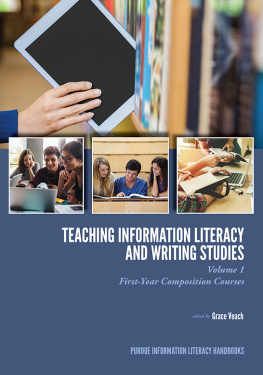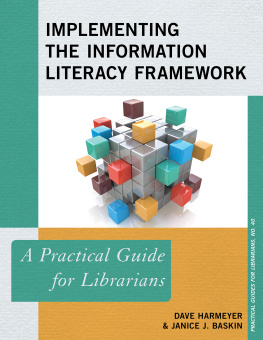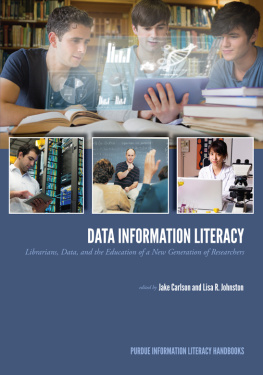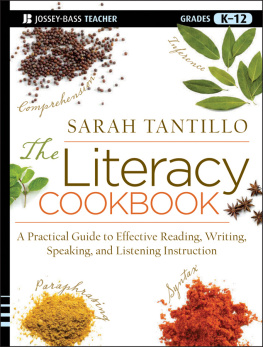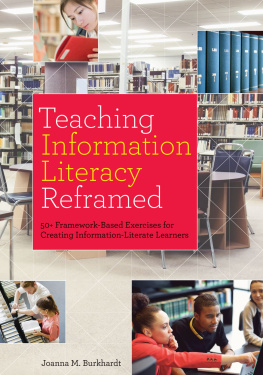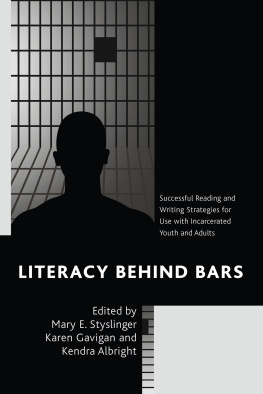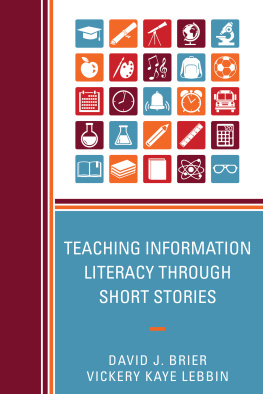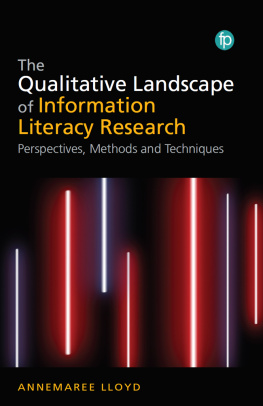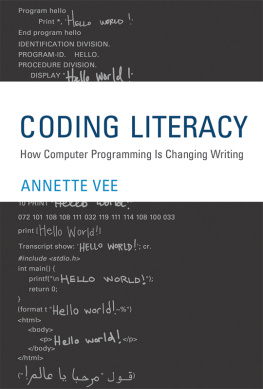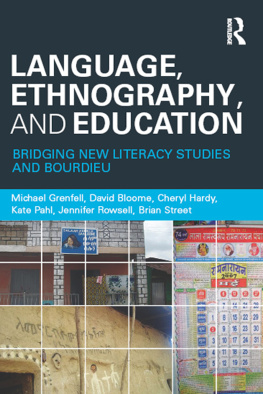Contents

TEACHING INFORMATION LITERACY
AND WRITING STUDIES
Volume 1
First-Year Composition Courses
Purdue Information Literacy Handbooks
Clarence Maybee, Series Editor
Sharon Weiner, Founding Series Editor
TEACHING INFORMATION LITERACY
AND WRITING STUDIES
Volume 1
First-Year Composition Courses
edited by Grace Veach
Purdue University Press, West Lafayette, Indiana
Copyright 2018 by Purdue University. All rights reserved.
Printed in the United States of America.
Cataloging-in-Publication Data available from the Library of Congress.
Paper ISBN: 978-1-55753-828-4
ePub ISBN: 978-1-61249-547-7
ePDF ISBN: 978-1-61249-548-4
Cover images
Top: Wavebreakmedia/iStock/Thinkstock
Bottom left: Jacob Ammentorp Lund/iStock/Thinkstock
Bottom center: Wavebreakmedia/iStock/Thinkstock
Bottom right: Dekdoyjaidee/iStock/Thinkstock
CONTENTS
I am pleased to introduce this third volume in the Purdue Information Literacy Handbooks series. This book is highly relevant for all college and university first-year curricula. Many institutions require first-year students to take writing courses. These courses are optimal for preparing students with the foundation for working critically with information for academic purposes. Grace Veach compiled an outstanding array of perspectives and approaches to collaboration on teaching first-year writing courses. The chapter authors depict experts in two academic disciplineslibrary science and writing studieswho have shared with each other their knowledge of current theories, methods, and models. They reconciled differences in perspective, terminology, models, and disciplinary knowledge to arrive at customized teaching strategies that develop students understanding of using information in research processes. The authors articulate the richness, depth, and effectiveness of their particular collaborations in a manner that shows how far the integration of information literacy with first-year writing courses has progressed in our field and, specifically, in these schools.
This book is impressive for its insight, depth, and openness to working with different theories and models in both writing studies and information literacy. Faculty and graduate students who teach first-year writing courses and information literacy librarians would benefit greatly from studying it together, discussing it, and applying it in their teaching.
Sharon Weiner, EdD, MLS
Founding Series Editor
Professor of Library Science Emerita and W. Wayne Booker Chair Emerita in Information Literacy, Purdue University Libraries August 2018
In 2011 when I began my doctoral dissertation on information literacy and writing studies, I discovered two fieldslibrary science and writing studiesthat both claimed interest in information literacy and researched and wrote about it. Information literacy (IL) has been the topic of discussion in multiple disciplines, but only in librarianship is information literacy crucial to the life or death of the discipline. I may be exaggerating a bit here, but the situation in librarianship in the early 21st century is such that the existence of libraries is being questioned and librarians have felt a pressing need to prove their worth.
Since the 1980s, information literacy has borne a large portion of the burden of this proof in academic librarianship. With the increasing pressure from accrediting bodies to assess outcomes, librarians, with their traditional emphasis on storage and retrieval of physical items, have been hard pressed to prove their worth through the traditional numbers of items held or books checked out. Even the traditional librarian function of indexing and cataloging data is increasingly centralized; services such as OCLC provide more and more of the cataloging before physical items reach the library, and database providers have already indexed and cataloged their information. The traditional how to use the databases function of the librarian is also being eroded by the rapidly growing adoption of discovery services, which pre-index all of a librarys database content into one searchable database. The emphasis on learning outcomes, coupled with the growing availability of materials in electronic formats, has made the traditional means of assessing the library (i.e., collection size) nearly irrelevant. Information literacy, then, not only provides student learning outcomes that can be assessed, but it has been an area of the curriculum not already staked out as the possession of another discipline.
Information literacy also plays a key role in the health of Rhetoric and Composition. A perpetual underdog discipline, Rhetoric and Composition has struggled to gain a foothold in English departments where it has been placed. Other academic departments often see it as only a stepping-stone to real writing, defined by them as writing in their academic discipline. By forming and strengthening partnerships with library faculty, compositionists will gain valuable allies in the constant fight for institutional capital. Even more important, the coordinated efforts of two disciplines with overlapping masteries in information literacy should have a positive effect on student learning. Students who learn to skillfully incorporate high-quality sources into their academic writing will make both the librarians and the writing instructors valuable colleagues to their peers in the other disciplines.
With a few exceptions, though (Arp, Woodard, Lindstrom, & Shonrock, 2006; Black, Crest, & Volland, 2001; Elmborg, 2005; Farber, 1999; Julien & Given, 2002; Mazziotti & Grettano, 2011), the two disciplines generally stayed in their respective corners. Both disciplines had their own approaches and their own domains (i.e., what they expected to own and what they expected the other discipline to cover) (Ackerson & Young, 1994; Bizup, 2008; Britt & Aglinskas, 2002; Leeder, Markey, & Yakel, 2012; Spivey & King, 1989).
With the publication of the Framework for Success in Postsecondary Writing (2011) and the ACRLs Framework for Information Literacy for Higher Education (Association of College and Research Libraries, 2015), the disciplines, which had been approaching each other in the intervening years, began to have full-fledged conversations. Although they may have been centered on those two frameworks in the early days of the collaborations, they began to branch out and cover nearly every area where they converged, and even to find new convergences.
Into this conversation, then, comes this volume, which examines information literacy as it is taught to and used by first-year college students in first-year writing (FYW) programs. Schools use varied terminology for first-year programs, so some chapters will refer to first-year composition (FYC) or first-year experience (FYE) classes as well as FYW. These chapters offer practical suggestions for successfully incorporating information literacy into first-year writing classes, with theoretical support from key scholars in both librarianship and writing studies. In many cases, these chapters are cowritten by librarians and writing specialists who are collaborating on a local level as they investigate information literacy teaching through different theoretical lenses and pedagogical styles.
The book is divided into five sections. describe their institutions reaction to a curriculum revision that was mandated during this time period, and the efforts of librarians and writing faculty to allow the disciplines to collaborate in designing a new freshman-level course that would combine writing and research by allowing the two disciplines to inform each other.

